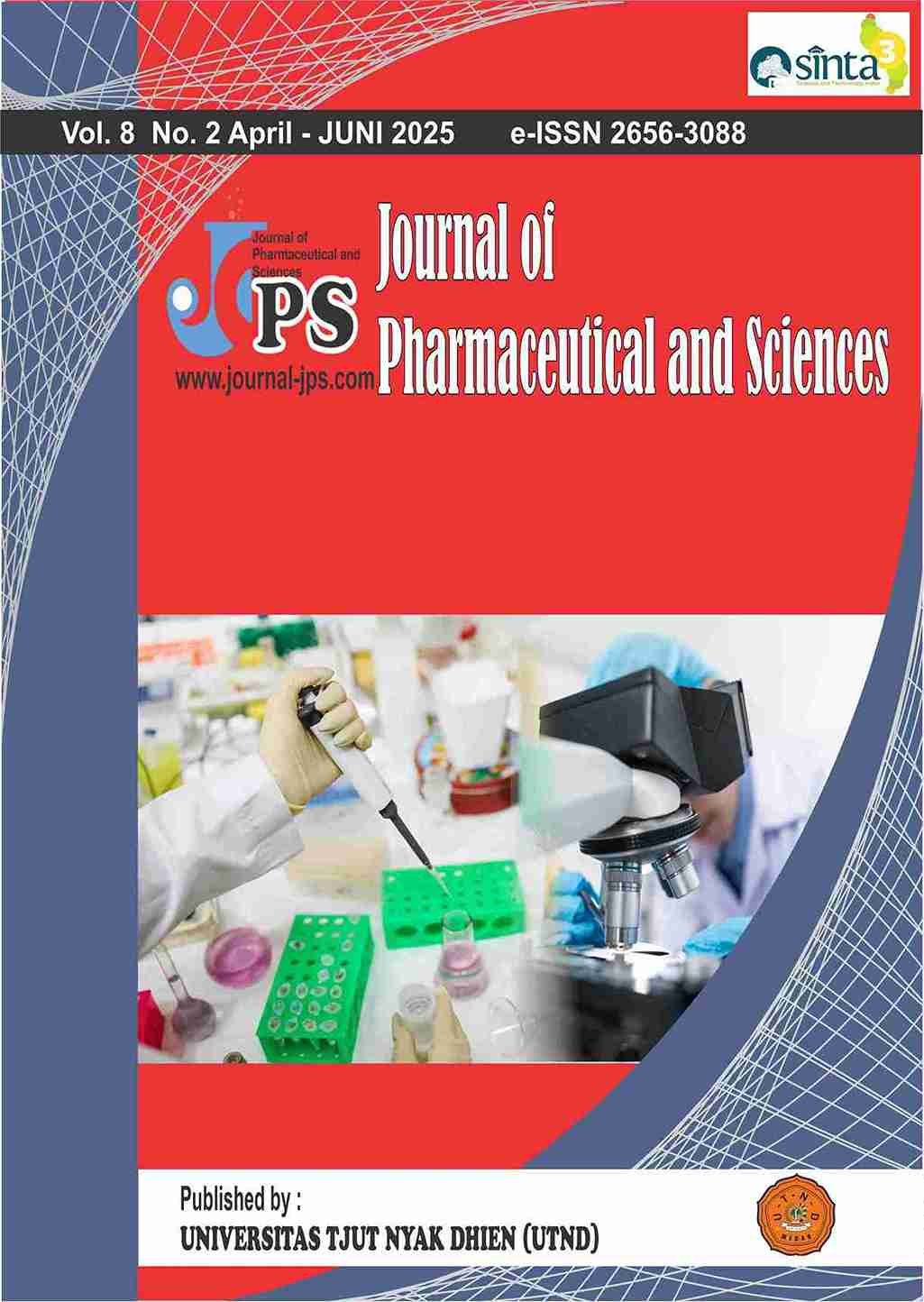Knowledge and Attitudes of Third-Trimester Pregnant Women Regarding Exclusive Breastfeeding Education
Main Article Content
Page: 859-867
Abstract
Background: According to data from the World Health Organization (WHO), only 38% of infants aged 0–6 months worldwide were exclusively breastfed, with an increase to 44% in 2020. The low coverage of exclusive breastfeeding is influenced by mothers’ lack of knowledge and attitudes regarding its importance. Objective: This study aims to examine the effect of education on the knowledge and attitudes of third-trimester pregnant women regarding exclusive breastfeeding. Methods: A quantitative approach was employed using a one-group pretest and posttest design within a cross-sectional framework. The sample consisted of 35 third-trimester pregnant women selected through total sampling at BPM Juliana Dalimunthe, S.Keb., Bdn, located in Tembung, Deli Serdang Regency, in November 2024. Data were collected using questionnaires and analyzed using the paired sample t-test. Results: There was a significant improvement in the knowledge and attitudes of pregnant women after receiving the educational intervention. The mean knowledge score increased from 70.86 to 76.00, and the attitude score from 72.11 to 79.71, with a p-value of 0.00 (< 0.05) for both variables. Conclusion: Education on exclusive breastfeeding has a significant effect on improving the knowledge and attitudes of third-trimester pregnant women. These findings highlight the importance of health education in preparing mothers for successful exclusive breastfeeding.
Downloads
Article Details

This work is licensed under a Creative Commons Attribution-NonCommercial-ShareAlike 4.0 International License.
References
Dewi PDPK. Prediktor Kegagalan Pemberian ASI Eksklusif di Wilayah Kerja Puskesmas Sawan I Kabupaten Buleleng. J Ilm Bidan 2020;5.
Baskoro A. ASI dan Panduan Praktis ibu menyusui 2018.
Kemenkes RI. Menurut Undang-Undang Nomor 17 Tahun 2023 20203.
Friscila I, Mahdiyah D, Ulfa IM. Faktor-Faktor Yang Mempengaruhi Ibu Menyusui Dalam Upaya Pemberian Asi Ekslusif Di Wilayah Kerja Puskesmas Tumbang Lapan: Factors Affecting Breastfeeding Mothers In Exclusive Breastfeeding Efforts In The Working Area Of Puskesmas Tumbang Lapan. J Ilm Kebidanan (Scientific J Midwifery) 2024;10:165–70. DOI: https://doi.org/10.33023/jikeb.v10i2.2081
Ihsani KA. Sistem Pendukung Keputusan Pemilihan Menu Makanan Sehat Untuk Bayi Sebagai Pendamping ASI (MPASI) Menggunakan Fuzzy Inference System Metode Mamdani 2021.
Abani TRK, Paulus AY, Djogo HMA. Fakor-Faktor Yang Berhubungan Dengan Perilaku Pemberian Asi Eksklusif Pada Bayi Usia 6-24 Bulan Di Puskesmas Camplong Kabupaten Kupang. CHMK Midwifery Sci J 2021;4:215–27. DOI: https://doi.org/10.33024/mnj.v1i1.5752
Roesli U. Mengenal ASI eksklusif. Niaga Swadaya; 2018.
Rahmayanti R, Adha D, Wahyuni F. Pengaruh Edukasi Online Berbasis Family Centered Maternity Care Terhadap Self Efficacy Ibu Postpartum Dalam Pemberian Asi Eksklusif. J Kesehat Mercusuar 2021;4:92–100. DOI: https://doi.org/10.36984/jkm.v4i1.202
Sugiyono. Metodologi Penelitian Kuantitatif Kualitatif dan R&D. Bandung: Alfabeta; 2019.
Riyanto S, Putera AR. Metode Riset Penelitian Kesehatan & Sains. Deepublish; 2022.
Oktarina OO, Wardhani YF. Perilaku pemenuhan gizi pada ibu menyusui di beberapa etnik di indonesia. Bul Penelit Sist Kesehat 2020;22:236–44. DOI: https://doi.org/10.22435/hsr.v22i4.1550
Ekayanthi NWD, Suryani P. Edukasi gizi pada ibu hamil mencegah stunting pada kelas ibu hamil. J Kesehat 2019;10:312–9. DOI: https://doi.org/10.26630/jk.v10i3.1389
Hartati S, Sukarni; Hubungan Pengetahuan dan Sikap Ibu dengan Pemberian ASI Eksklusif di Desa Pasar Banjit Wilayah Kerja Puskesmas Banjit Way Kanan Tahun 2017. J Gizi Aisyah 2019;2:56–64.
Romaulinasipayung R, Sivafaujiah S, Triwidowati T, Eliyanaependi E. Faktor-Faktor Yang Mempengaruhi Pemberian ASI Eksklusif Pada Bayi 0-6 Bulan di TMPB “E” Tahun 2023. J Ilm Bidan 2024;8. https://doi.org/10.69935/jidan.v8i1.61. DOI: https://doi.org/10.69935/jidan.v8i1.61
Keni NWA, Rompas S, Gannika L. Tingkat Pengetahuan Dan Sikap Dengan Teknik Menyusui Pada Ibu Pasca Melahirkan. J Keperawatan 2020;8:33. https://doi.org/10.35790/jkp.v8i1.28409. DOI: https://doi.org/10.35790/jkp.v8i1.28409
Khoirunnisa E. Correlation Between Husband’s Support and Primipara’s Willingness to Provide Exclusive Breastfeeding. J Heal Sci 2023;16:318–24. https://doi.org/10.33086/jhs.v16i03.4517. DOI: https://doi.org/10.33086/jhs.v16i03.4517
Siregar FLS, Aritonang E, Sudaryati E, Nurmaini N. Relationship Between the Support From Healthcare Workers and Mother’s Motivation to Exclusively Breastfeed in Medan 2023:162–8. https://doi.org/10.2991/978-94-6463-120-3_25. DOI: https://doi.org/10.2991/978-94-6463-120-3_25
Metin HT, Yiğit F. Comparison of the Effectiveness of Video and Breastfeeding Simulator Support to Mothers Who Could Not Breastfeed Their Babies in the Neonatal Intensive Care Unit: A Randomized Controlled Study 2024. https://doi.org/10.21203/rs.3.rs-4879620/v1. DOI: https://doi.org/10.21203/rs.3.rs-4879620/v1
Entwistle F, Kendall S, Mead M. Breastfeeding Support – The Importance of Self‐efficacy for Low‐income Women. Matern Child Nutr 2010;6:228–42. https://doi.org/10.1111/j.1740-8709.2009.00202.x. DOI: https://doi.org/10.1111/j.1740-8709.2009.00202.x
Ingram J, Johnson D, Condon L. The Effects of Baby Friendly Initiative Training on Breastfeeding Rates and the Breastfeeding Attitudes, Knowledge and Self-Efficacy of Community Health-Care Staff. Prim Health Care Res Dev 2011;12:266–75. https://doi.org/10.1017/s1463423610000423. DOI: https://doi.org/10.1017/S1463423610000423
Kempenaar L, Darwent K. The Impact of Peer Support Training on Mothers’ Attitudes Towards and Knowledge of Breastfeeding. Matern Child Nutr 2011;9:359–68. https://doi.org/10.1111/j.1740-8709.2011.00373.x. DOI: https://doi.org/10.1111/j.1740-8709.2011.00373.x
Motee A, Ramasawmy D, Pugo-Gunsam P, Jeewon R. An Assessment of the Breastfeeding Practices and Infant Feeding Pattern Among Mothers in Mauritius. J Nutr Metab 2013;2013:1–8. https://doi.org/10.1155/2013/243852. DOI: https://doi.org/10.1155/2013/243852
Yotebieng M, Chalachala JL, Labbok MH, Behets F. Infant Feeding Practices and Determinants of Poor Breastfeeding Behavior in Kinshasa, Democratic Republic of Congo: A Descriptive Study. Int Breastfeed J 2013;8. https://doi.org/10.1186/1746-4358-8-11. DOI: https://doi.org/10.1186/1746-4358-8-11
Javanparast S, Newman L, Sweet L, McIntyre E. Analysis of Breastfeeding Policies and Practices in Childcare Centres in Adelaide, South Australia. Matern Child Health J 2011;16:1276–83. https://doi.org/10.1007/s10995-011-0887-5. DOI: https://doi.org/10.1007/s10995-011-0887-5
Seyyedi N, Rahmatnezhad L, Mesgarzadeh M, Khalkhali HR, Seyyedi N, Rahimi B. Effectiveness of a Smartphone-Based Educational Intervention to Improve Breastfeeding. Int Breastfeed J 2021;16. https://doi.org/10.1186/s13006-021-00417-w. DOI: https://doi.org/10.1186/s13006-021-00417-w
Kronborg H, Kok G. Development of a Postnatal Educational Program for Breastfeeding Mothers in Community Settings. J Hum Lact 2011;27:339–49. https://doi.org/10.1177/0890334411422702. DOI: https://doi.org/10.1177/0890334411422702
Alzaheb RA. Factors Influencing Exclusive Breastfeeding in Tabuk, Saudi Arabia. Clin Med Insights Pediatr 2017;11. https://doi.org/10.1177/1179556517698136. DOI: https://doi.org/10.1177/1179556517698136





